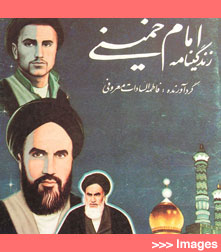 Khomeini, Fallaci, and the medieval rag Khomeini, Fallaci, and the medieval rag
Part 3: Returning to Iran: 1986-87
>>>Images
Sima Nahan
March 16, 2006
iranian.com
In September of 1979, Oriana Fallaci was granted an interview with Khomeini, excerpts from which were published in the New York Times Magazine. It is a rare and symbolic audience: the emerging leader of Islamic Patriarchy vs. Modern Man qua Emancipated Woman (donning an obligatory veil in professional accommodation). It is a revealing instance of the intellectual and emotional impasse that has come to overpower so many attempts towards establishing an "East/West" dialogue.
On questions of freedom and democracy -- ideals to which the Ayatollah, interestingly enough, lays equal claim -- the impasse is intellectual. Khomeini's definition of freedom emerges in response to Fallaci's assertion that “many in the country say that the revolution did not bring freedom."
Khomeini: “You saw very well how after the death of Ayatollah Taleghani millions of persons went into the streets without the threat of violence. This shows that there is freedom. It also shows that the people only follow men of God. And this is freedom.”
This appears in the very first passage of the interview. Fallaci continues by taking the Imam to task on her evidence of instances of violations of human rights: political persecution, torture, closing down of newspapers, and repression of ethnic minorities, and, of course, women. In the face of the Imam's denial of all of the above she asks Khomeini about his prohibition of the title of "Democratic" for his Islamic Republic. Khomeini answers that the word "Islam" is perfect and not in need of any qualifiers: "Islam is everything, it means everything." To demonstrate how Islam contains the notion of democracy within itself he relates a Shiite hadith -- a narrative exposition of the Traditions of Islam:
“When Ali succeeded the Prophet... he happened to have a dispute with a Jew. And the Jew had him called by the judge, and Ali accepted the summons of the judge, and went to him. And when he entered the room the judge stood up, but Ali said to him angrily: ‘Why do you stand up when I enter the room but not when the Jew entered? Before a judge the contending parties should be equals.’ Afterward Ali accepted the sentence which was unfavorable to him. I ask you, you who have traveled and seen all forms of government and know history, can you give me a better example of democracy?”
Fallaci responds:
“Imam, democracy means much more than that. Many Iranians think this way too -- the same Iranians who don't understand the direction your Islamic Republic is taking.”
The Imam, of course, does not tolerate dissent gracefully:
“If you foreigners do not understand, too bad for you. It is none of your business, You have nothing to do with our choices. If some Iranians don't understand it, too bad for them too. It means that they have not understood Islam.”
 Regardless of whether it is indeed Islam that Fallaci and "some Iranians" do not understand, early into the interview it becomes clear that it is the historical consciousness of Fallaci and the religious consciousness of Khomeini that clash irreconcilably. Regardless of whether it is indeed Islam that Fallaci and "some Iranians" do not understand, early into the interview it becomes clear that it is the historical consciousness of Fallaci and the religious consciousness of Khomeini that clash irreconcilably.
Fallaci's experienced eye in detecting generic fascism picks up the signs of the emergence of such a state in Iran and she presents Khomeini with her evidence for "fascist fanaticism." Khomeini responds with a flat denial: "Fascism and Islamism are absolutely incompatible. Fascism arises in the West, not among people of Islamic culture." Fallaci presses the issue by evoking the example of the "popular phenomenon" of fascism in Italy, and the similar "obedience" that Mussolini inspired in his people. Khomeini answers that fascism is impossible in the Islamic world because "our masses are Muslims, educated by the clergy -- that is, by men who preach spirituality and goodness."
The topic has to be dropped on account of an almost rhetorical principle: in Khomeini's view questions of history and ideology (hence any discourse on fascism) cannot and do not have a bearing on any discussion of Islam which is strictly the realm of a simple and straightforward institutionalization of "spirituality and goodness."
Later on, as a result of Fallaci's questions on some incidents that had begun to inaugurate the era of Islamic terror in Iran -- the stoning of a pregnant woman for adultery and her lover's sentence of a hundred lashes, executions of Kurds, and "counter revolutionaries" -- the Imam is struck with the strategic "fatigue" with which Iranians have come to expect him to dismiss the mention of sensitive issues. But Fallaci presses the issues by insisting on a discussion of the situation of women in Iran -- first the question of the veil:
“...this chador that they made me put on, to come to you, and which you insist all women must wear. Tell me, why do you force them to hide themselves, all bundled up under these uncomfortable and absurd garments, making it hard to work and move about? And yet, even here, women have demonstrated that they are equal to men. They fought just like the men, were imprisoned and tortured. They, too, helped make the revolution.”
Khomeini says that "elegant" women who show off "their necks, their hair, their shapes" played no role in the fighting against the Shah:
“They never did anything good, not those. They do not know how to be useful, neither socially, nor politically, nor professionally. And this is so because by uncovering themselves they distract men and upset them. They even distract and upset other women.”
Regretfully for her readers Fallaci does not follow up on her question in a way that would encourage the Imam to expand on his notions of the female body: that singular combination of beauty and evil that turns each woman into a most powerful she-devil, "distracting" and "upsetting" the entire human society. It is particularly unfortunate that Abolhasan Banisadr, the first president of Iran, who was also present at the interview did not have a chance to expound for Fallaci his "scientific" theories on the existence of radiations emanating from women's hair that wreak havoc in the electrical integrity of the male system. Instead, Fallaci makes an attempt at poking fun by asking Khomeini how it is possible to swim in a veil, which irritates the Imam again:
 “This is none of your business. Our customs are none of your business. If you do not like Islamic dress you are not obliged to wear it. Besides, Islamic dress is for good and proper young women.” “This is none of your business. Our customs are none of your business. If you do not like Islamic dress you are not obliged to wear it. Besides, Islamic dress is for good and proper young women.”
Funny enough, the suggestion that she is not a “good and proper” young woman angers Fallaci:
“That's very kind of you, Imam. And since you said so, I'm going to take off this stupid, medieval rag right now. There. Done...” >>> Images
This emotional reaction could well have created a second impasse and ended the interview were it not for the Imam's surprising acceptance of Fallaci's little act of rebellion. In perhaps his single display of tolerance for western disregard for Islamic norms -- or maybe out of an inadvertent respect for a woman who "has travelled and seen all forms of government and knows history" -- Khomeini does not call off the interview >>> Part 4
[Part (1) (2) (3) (4) (5) (6) (7) (8) (9) (10) (11) (12) (13) (14) (15) (16) (17)]
About
Sima Nahan is a writer based in California. She graduated from Reza Shah Kabir high school in Tehran.
|